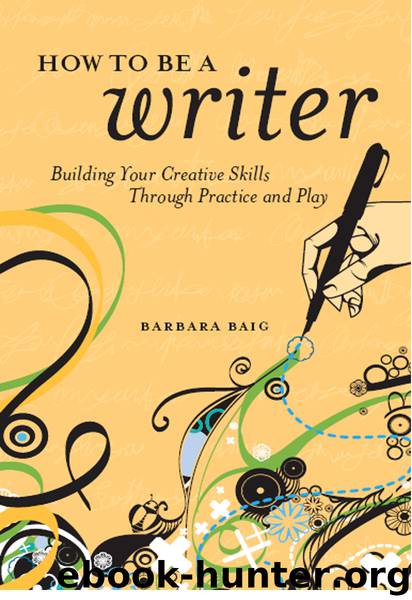How to Be a Writer by Barbara Baig

Author:Barbara Baig
Language: eng
Format: epub
Tags: epub, ebook
Publisher: F+W Media
Published: 2010-06-08T16:00:00+00:00
CHAPTER 10
The Sherlock Holmes School of Writing
You see but you do not observe.
— SHERLOCK HOLMES TO DR. WATSON, A Scandal in Bohemia
Sherlock Holmes, the famous fictional detective, wrote only rarely for publication about his cases; he left the writing to his friend Dr. John Watson. But in solving the strange and complex crimes that came his way, Holmes regularly used all of the writer's powers you've been experimenting with. He astonished Dr. Watson at their first meeting by telling the good doctor, quite correctly, “You have been in Afghanistan, I perceive.”9 Close and precise observation was the foundation of Holmes's method. Then he would draw his inferences based on those observations. (As he later explained to Dr. Watson, he observed him closely when they were introduced, noticing that Watson's face was tanned, though his wrists were pale, and that he was holding his arm stiffly as if it had been injured. From these and other details Holmes rapidly concluded that Watson had been a medical doctor in Afghanistan, where English troops were then engaged.)
When inference alone did not suffice, Holmes would search his memory for expertise he had acquired which would give him the information he needed. Though Holmes never graduated from college, he educated himself in the areas he knew would help him in his work: He made chemical experiments; he carefully studied footprints; and he made a scientific study of pipe, cigar, and cigarette tobaccos, so that he could identify at a glance a bit of ash left behind at a crime scene. He was a relentless collector of information about people and things, and had in his sitting room what amounted to his own personal encyclopedia. So, for example, when the King of Bohemia came to consult him about the adventuress Irene Adler, Holmes had only to look into his files to find her biography “sandwiched between that of a Hebrew rabbi and that of a staff-commander who had written a monograph upon the deep sea fishes.”10 And when he did not have the information he needed already, Holmes knew how to direct his curiosity to give him the right questions; and he knew how to do research — at a newspaper office, for instance — to get the information he needed.
Holmes also knew how to use his imagination to put himself in the place of the criminal and imagine how he or she had proceeded. Imagination, he often remarked, was essential to a good detective, and he scorned the Scotland Yard detectives who frequently consulted him for their lack of it.
No one who has read any of the Holmes stories can fail to notice that Holmes knew how to use his subconscious. Time after time Watson describes him as withdrawing into a kind of waking dream-state, half-dozing on his couch or idly scratching at his violin. And it was after he had meditated in this way upon all the material his other faculties had given him that he would suddenly come to himself and state — to his friend's amazement — “Ah, Watson, I have it now.
Download
This site does not store any files on its server. We only index and link to content provided by other sites. Please contact the content providers to delete copyright contents if any and email us, we'll remove relevant links or contents immediately.
Asking the Right Questions: A Guide to Critical Thinking by M. Neil Browne & Stuart M. Keeley(5766)
Autoboyography by Christina Lauren(5230)
Eat That Frog! by Brian Tracy(4529)
Dialogue by Robert McKee(4393)
Sticky Fingers by Joe Hagan(4193)
Journeys Out of the Body by Robert Monroe(3623)
Annapurna by Maurice Herzog(3465)
Full Circle by Michael Palin(3446)
Schaum's Quick Guide to Writing Great Short Stories by Margaret Lucke(3377)
Elements of Style 2017 by Richard De A'Morelli(3344)
The Art of Dramatic Writing: Its Basis in the Creative Interpretation of Human Motives by Egri Lajos(3064)
Atlas Obscura by Joshua Foer(2956)
Why I Write by George Orwell(2948)
The Diviners by Libba Bray(2932)
The Fight by Norman Mailer(2931)
In Patagonia by Bruce Chatwin(2924)
The Mental Game of Writing: How to Overcome Obstacles, Stay Creative and Productive, and Free Your Mind for Success by James Scott Bell(2908)
Venice by Jan Morris(2572)
The Elements of Style by William Strunk and E. B. White(2471)
